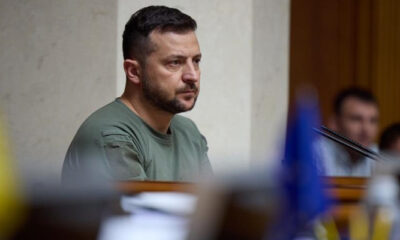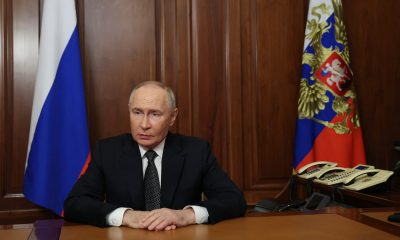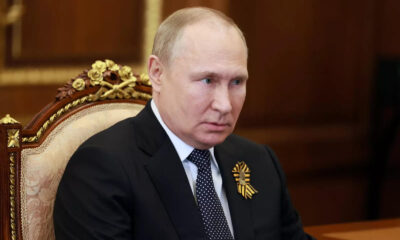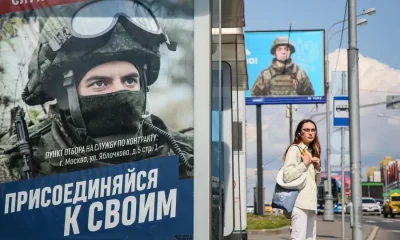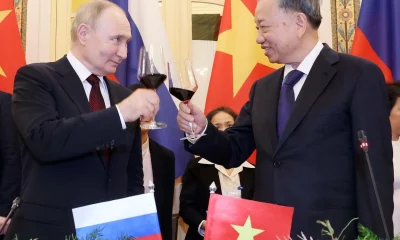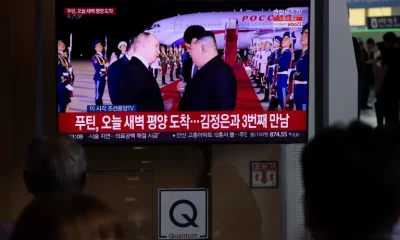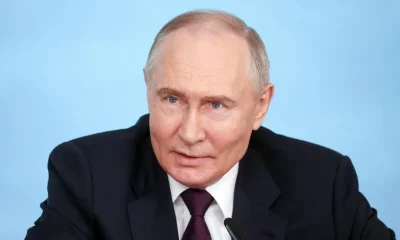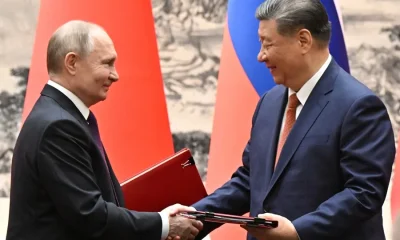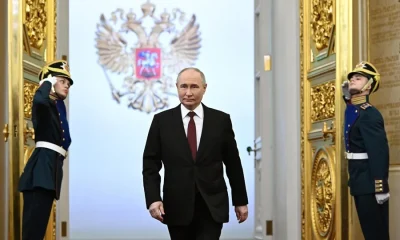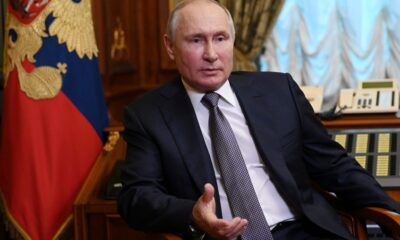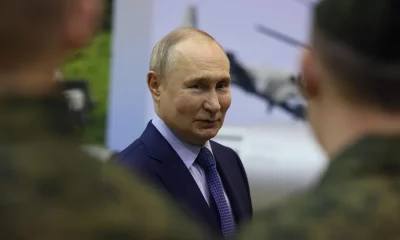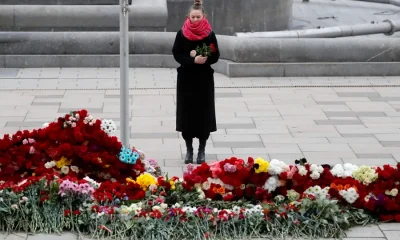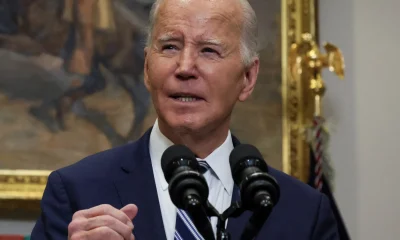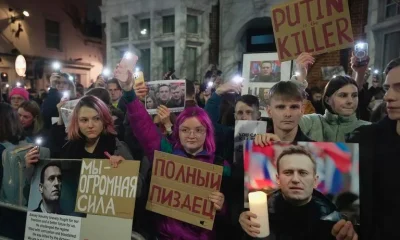International
Putin asks to resume peace negotiations with Ukraine
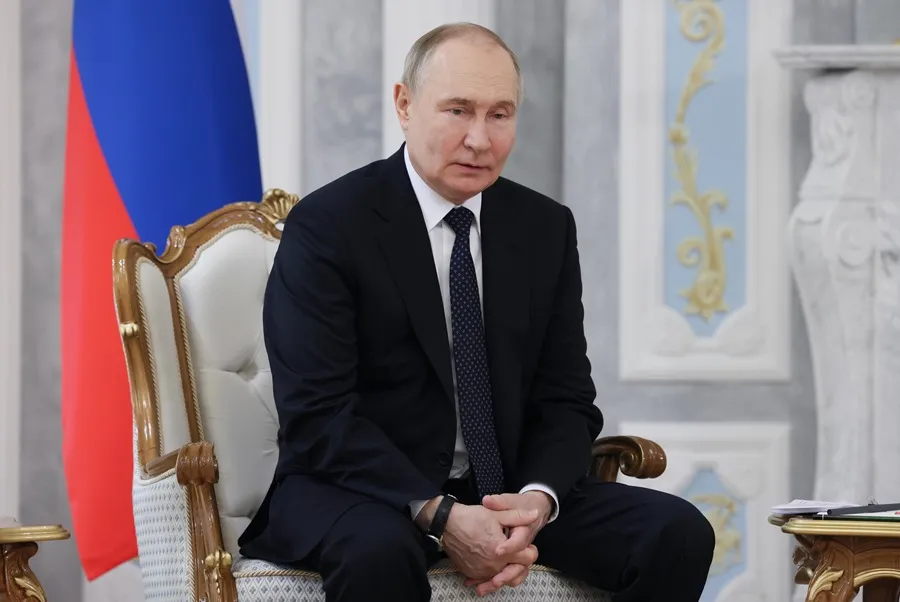
Russian President Vladimir Putin, was in favor of resuming peace negotiations with Ukraine on Friday, although he expressed his doubts about the legitimacy of his Ukrainian counterpart, Volodymyr Zelensky, whose mandate expired on May 20.
“Peace negotiations must be resumed and not through an ultimatum, but with common sense,” Putin said during a press conference in Minsk, the Belarusian capital.
Putin called on Ukraine to return to the negotiating table, although he warned that these should have as their final objective “the signing of legally binding documents.”
He recalled that Ukraine already signed a document of that kind at the end of March 2022 in Istanbul, but withdrew the signature under pressure from the West.
“Again there is talk of the need to return to the negotiations. Let them come back! But that they return not starting from what a party wants (…), but from the current situation on the ground. We are willing,” he said.
Putin wondered: “Who to negotiate with? It is not a trivial question (…) Russia is aware that the legitimacy of the current head of state (of Ukraine) has expired.”
“I believe that one of the objectives of the conference that was announced in Switzerland is that the Western community, the sponsors of the current Kiev regime, confirm the legitimacy of the current or no longer existing head of state,” he said.
When the time comes, Putin stressed that Moscow must be “completely sure” that it is dialoguing with a “legitimate power.”
Putin made this statement just as Russian troops are gaining ground both in the Donbas and in the second front that the Russian army opened in the northeastern region of Kharkov.
The Foreign Minister of Ukraine, Dmitro Kuleba, attributed this Friday the alleged willingness of the president of Russia, Vladimir Putin, to declare a ceasefire with the current demarcation line on the front to the fear that inspires him by the possibility of the triumph of the Peace Summit promoted by Kiev that will take place in Switzerland next month.
“Why are there Russian sources suddenly telling the media that Putin is willing to stop the war with the current lines on the battlefield? It’s simple. Putin is desperately trying to derail the Peace Summit of June 15 and 16 in Switzerland,” Kuleba wrote on his social network account X.
The Ukrainian Foreign Minister referred to information published in international media that cited four Russian sources according to which Putin would be willing to stop hostilities if Ukraine and the West agree to freeze the conflict.
Kuleba assured that “Putin have no intention at this time to stop the aggression against Ukraine.” According to the Ukrainian minister, the Russian president fears that the Swiss summit will end with a message of “unity” from “a global majority” that forces him to “opt for peace instead of war.”
“This is what the Peace Summit aspires to achieve. And that’s what he fears,” Kuleba said.
International
U.S. Senate Rejects Budget, Bringing Government Closer to Shutdown Amid DHS Dispute

The U.S. Senate voted on Thursday against a budget proposal in a move aimed at pressuring changes at the Department of Homeland Security (DHS), following the killing of two civilians during a deployment of immigration agents in Minneapolis.
All Senate Democrats and seven Republican lawmakers voted against the bill, which requires 60 votes to advance, pushing the country closer to a partial government shutdown that would cut funding for several agencies, including the Pentagon and the Department of Health.
The rejection came as Senate leaders and the White House continue negotiations on a separate funding package for DHS that would allow reforms to the agency. Proposed measures include banning Immigration and Customs Enforcement (ICE) agents from wearing face coverings and requiring them to use body-worn cameras during operations.
The vote took place just hours after President Donald Trump said he was “close” to reaching an agreement with Democrats and did not believe the federal government would face another shutdown, following last year’s record stoppage.
“I don’t think the Democrats want a shutdown either, so we’ll work in a bipartisan way to avoid it. Hopefully, there will be no government shutdown. We’re working on that right now,” Trump said during a Cabinet meeting at the White House.
International
Trump Says Putin Agreed to One-Week Halt in Attacks on Ukraine Amid Extreme Cold

U.S. President Donald Trump said on Thursday that he secured a commitment from Russian President Vladimir Putinto halt attacks against Ukraine for one week, citing extreme weather conditions affecting the region.
“Because of the extreme cold (…) I personally asked Putin not to attack Kyiv or other cities and towns for a week. And he agreed. He was very pleasant,” Trump said during a Cabinet meeting broadcast by the White House.
Trump acknowledged that several advisers had questioned the decision to make the call.
“A lot of people told me not to waste the call because they wouldn’t agree. And he accepted. And we’re very happy they did, because they don’t need missiles hitting their towns and cities,” the president said.
According to Trump, Ukrainian authorities reacted with surprise to the announcement but welcomed the possibility of a temporary ceasefire.
“It’s extraordinarily cold, record cold (…) They say they’ve never experienced cold like this,” he added.
Ukrainian President Volodymyr Zelensky later commented on the announcement, expressing hope that the agreement would be honored.
International
Storm Kristin Kills Five in Portugal, Leaves Nearly 500,000 Without Power

Storm Kristin, which battered Portugal with heavy rain and strong winds early Wednesday, has left at least five people dead, while nearly half a million residents remained without electricity as of Thursday, according to updated figures from authorities.
The revised death toll was confirmed to AFP by a spokesperson for the National Emergency and Civil Protection Authority (ANPEC). On Wednesday, the agency had reported four fatalities.
Meanwhile, E-Redes, the country’s electricity distribution network operator, said that around 450,000 customers were still without power, particularly in central Portugal.
Emergency services responded to approximately 1,500 incidents between midnight and 8:00 a.m. local time on Wednesday, as the storm caused widespread disruptions.
The Portuguese government described Kristin as an “extreme weather event” that inflicted significant damage across several regions of the country. At the height of the storm, as many as 850,000 households and institutions lost electricity during the early hours of Wednesday.
Several municipalities ordered the closure of schools, many of which remained shut on Thursday due to ongoing adverse conditions.
Ricardo Costa, regional deputy commander of the Leiria Fire Brigade, said residents continue to seek assistance as rainfall persists.
“Even though the rain is not extremely intense, it is causing extensive damage to homes,” he noted.
In Figueira da Foz, a coastal city in central Portugal, strong winds toppled a giant Ferris wheel, underscoring the severity of the storm.
-

 Central America4 days ago
Central America4 days agoGuatemala seizes over a ton of cocaine hidden in flour at Pacific port
-

 International4 days ago
International4 days agoHistoric snowstorm paralyzes Toronto after 60 centimeters of snow
-

 Central America3 days ago
Central America3 days agoGuatemala Police Arrest Prison Guard Caught in the Act of Extortion
-

 Central America3 days ago
Central America3 days agoBukele leads public trust rankings as UCA survey highlights gains in security
-

 Central America3 days ago
Central America3 days agoHonduras swears in conservative president Asfura after disputed election
-

 International4 days ago
International4 days agoSpain’s irregular migrant population rises to 840,000, study finds
-

 International2 days ago
International2 days agoFootball Fan Killed in Clashes After Colombian League Match
-

 International3 days ago
International3 days agoWinter Storm Fern Leaves 30 Dead and Over One Million Without Power Across the U.S.
-

 Central America2 days ago
Central America2 days agoGuatemala President Says Starlink Terminal Found Inside Prison
-

 Sin categoría3 days ago
Sin categoría3 days agoEight Killed in Series of Armed Attacks in Ecuador’s Manabí Province
-

 International3 days ago
International3 days agoDoomsday clock moves to 85 seconds before midnight amid rising global risks
-

 International3 days ago
International3 days agoSpain approves plan to regularize up to 500,000 migrants in Historic Shift
-

 International4 days ago
International4 days agoRights group says nearly 6,000 killed in Iran protest crackdown
-

 International2 days ago
International2 days agoRubio Says U.S. Could Participate in Follow-Up Russia-Ukraine Talks
-

 International2 days ago
International2 days agoMissing Spanish Sailor Rescued After 11 Days Adrift in Mediterranean
-

 Sin categoría3 days ago
Sin categoría3 days agoEl Salvador Launches Fourth Year of Ocean Mission to Protect Marine Ecosystems
-

 International4 days ago
International4 days agoVenezuela frees at least 80 political prisoners, NGO says
-

 International4 days ago
International4 days agoEU launches new probe into X over AI-generated fake nude images
-

 International22 hours ago
International22 hours agoU.S. Senate Rejects Budget, Bringing Government Closer to Shutdown Amid DHS Dispute
-

 International4 days ago
International4 days agoSevere winter storm grips U.S., leaves multiple dead as extreme cold persists
-

 International4 days ago
International4 days agoFrance debates ban on social media for children under 15
-

 International22 hours ago
International22 hours agoStorm Kristin Kills Five in Portugal, Leaves Nearly 500,000 Without Power
-

 International22 hours ago
International22 hours agoTrump Says Putin Agreed to One-Week Halt in Attacks on Ukraine Amid Extreme Cold
-

 International22 hours ago
International22 hours agoMan Arrested After Vehicle Crashes Into Jewish Institution in Brooklyn

























